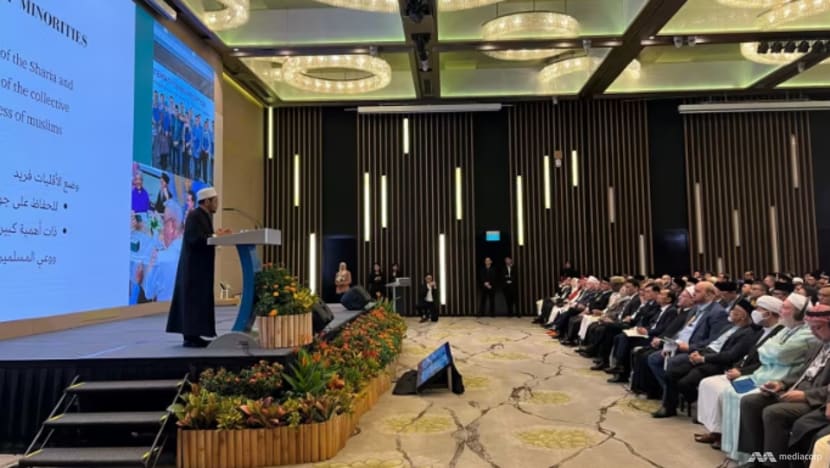Singapore Muslims allowed to eat lab-grown meat if it's from halal animal cells, free from non-halal ingredients: Mufti

A piece of cultivated chicken as it cooks on a grill at a Eat Just office on Jul 27, 2023 in Alameda, California. (Photo: AFP/Getty Images North America/Justin Sullivan)

This audio is generated by an AI tool.
- It will be permissible for Muslims to eat lab-cultivated meat based on a decision by the Islamic Religious Council of Singapore
- This is provided the cells are from animals that are halal or permissible in Islam, and the final ingredients do not have any non-halal components
- Such a move will make Singapore one of the first countries to produce cultivated meat and ensure it is halal for Muslims
- The use of artificial intelligence to do research on Islamic texts and laws will also be further studied
SINGAPORE: It will be permissible, or halal, for Muslims to consume lab-cultivated meat if the cells are from animals that are also halal, and the final ingredients do not contain any non-halal components.
Dr Nazirudin Mohd Nasir, the Mufti of Singapore, said that this decision is an example of how fatwa research has to evolve with modern technology and social change.
He was giving a speech on Friday (Feb 2) to launch a two-day conference on fatwa in contemporary societies.
In Islam, fatwas are religious rulings to guide the Muslim community on the various aspects of religious life and are formal interpretations of Islamic law by a qualified religious scholar known as a mufti.
Mr Masagos Zulkifli, Minister-in-charge of Muslim Affairs, told reporters on the sidelines of the conference that the issue of lab-cultivated meat had been studied by the Islamic Religious Council of Singapore (MUIS) since 2022, and that the fatwa for this decision by MUIS will be issued "soon".
"We can be one of the first countries in the world to actually lead in this field, not only producing cultivated meat, but in also ensuring it is halal for Muslims to consume," he added.
The fatwa has since been issued.
"Novel foods, which can be produced through more environmentally sustainable means compared to traditional agriculture and aquaculture, offer a practical way to contribute to environmental sustainability," MUIS said in a media release on Feb 3.
It added that the religious guidance was developed because questions arose about its permissibility for Muslim consumption, after Singapore approved of the sale of cultivated meat products in here in 2020.
"There is a global impetus for alternative, sustainable food solutions. While still currently in the developmental stage, with the eventual emergence of novel foods, it is necessary to have a clear religious position early on the permissibility of consumption of such foods," MUIS said.
The conference, held at the Parkroyal on Beach Road hotel, was attended by about 400 guests comprising international religious leaders, ambassadors, as well as religious and community leaders here. Deputy Prime Minister Heng Swee Keat was also present.
In a speech to launch the conference, Dr Nazirudin said that the religious authorities should allow for adjustments to its rulings as technological developments and social changes take place.
“We could certainly work towards an Islam that seeks to preserve and protect all human life, and secure all forms of well-being, instead of holding an exclusivist view that limits who and what we work with,” Singapore's top Islamic leader said.
One such development is that of alternative food sources. Singapore is the first country in the world to approve the sale of lab-grown meat.
Dr Nazirudin said that while there are those who argue that there is no need for such food sources and that the Muslim community should continue to enjoy “real” food such as real meat, the Fatwa Committee of MUIS had carefully considered whether lab-cultivated meat is permissible for consumption by Muslims.
Previously, there was no Islamic ruling on whether lab-cultivated meat may be consumed by Muslims here.
Dr Nazirudin said that the committee, which he chairs, visited laboratories where meat is cultivated in bioreactors. He acknowledged that there were “a lot of new things to learn from the technology itself”.
“While these are originally animal cells, we are essentially dealing with something fundamentally different,” he said. “So how should we, in Islamic jurisprudence ... treat something that looks familiar ... yet is fundamentally different?
"When should we apply well-established principles and rules, and when do we have to think afresh?”
He said that one option is to play it safe and let future generations deal with the issue, but doing so will risk a larger crisis in the future.
“The committee decided that it is permissible, it is halal, to consume lab-cultivated meat where the cells are from animals that are halal or permissible in Islam, and where the final ingredients do not contain any non-halal components,” he added.

ARTIFICIAL INTELLIGENCE FOR FATWA RESEARCH
Dr Nazirudin also said that the Muslim community will need to contend with another novel issue, which is the role of artificial intelligence (AI).
For example, generative AI such as ChatGPT can help boost fatwa research and outreach in “comprehensive and responsible" ways.
“There are many possibilities, but also landmines. The onus is on us to figure out how it can enhance our work,” he added. “We are not suggesting for AI to replace the fatwa committee, the Mufti ... some of us still need our jobs for now.”
Studies are underway on how to engineer and train large language AI models to look at Singapore’s fatwas and its methodologies, he noted.
“By doing this, generative AI can help us identify important dimensions and aspects of a new question or issue we want to deal with ... We don't want the AI to issue the fatwas, we want the AI to tell us what are the areas (we) must respond to and discuss when looking at a particular question.
"This will help us minimise gaps when issuing a fatwa.”
To this end, his team at the Office of the Mufti has embarked on an AI project with Google, supported by Smart Nation Singapore, an initiative by the Singapore Government to create solutions by harnessing technology.
The conference is the second edition of the inaugural one in 2017, and continues on Saturday with more discussions on lab-grown meat, AI, finance and medical technology.
This article was originally published in TODAY.
















